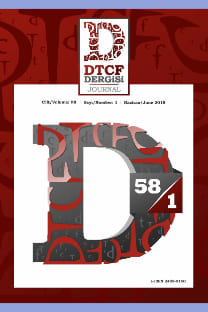"KÜLTÜREL YOKSUNLUK" VE GEÇMİŞE TAKILMIŞ BİR İRLANDALI
"CULTURAL BEREAVEMENT" AND AN IRISHMAN STUCK IN THE PAST
___
- Andrews, Elmer. The Art of Brian Friel: Neither Reality Nor Dreams. Basingstoke: Macmillan, 1995.
- Brennan, E. 2016. "Television in Ireland before Irish Television: 1950s Audiences and British Programming." Shared Histories Conference 2016, National Library, Dublin, Ireland. 6 July 2016. Dublin Institute of Technology, Dublin, 2017.
- Friel, Brian. "In Interview with Graham Morrison" Brian Friel: Essays, Diaries, Interviews, 1964-1999. Ed. Christopher Murray. London: Faber and Faber, 1999. 4-14.
- ---. "In Interview with Peter Lennon" Brian Friel: Essays, Diaries, Interviews, 1964- 1999. Ed. Christopher Murray. London: Faber and Faber, 1999. 1-3.
- ---. Philadelphia, Here I Come! London: Faber and Faber, 1965.
- ---. "Self-Portrait: Brian Friel Talks about His Life and Work." Brian Friel in Conversation. Ed. Paul Delaney. Ann Arbor: University of Michigan Press, 2000. 98-111.
- Hawkins, Maureen S. G. "Schizophrenia and the Politics of Experience in Three Plays by Brian Friel." Modern Drama 6.3 (1996): 465-74.
- Maxwell, D. E. S. A Critical History of Irish Drama: 1891-1980. Cambridge: Cambridge UP, 1984.
- Mortimer, Claire. "Angry Old Women: Peggy Mount and the Performance of Female Ageing in the British Sitcom." Critical Studies in Television 10.2 (2015): 71- 86. Sagepub. Web. 20 November 2016.
- Murray, Christopher. The Theatre of Brian Friel: Tradition and Modernity. London: Bloomsbury, 2014.
- Pine, Richard. Brian Friel and Ireland's Drama. London: Routledge, 1990.
- Savage, Robert J. Irish Television: The Political and Social Origins. Cork: Cork UP, 1996.
- State, Paul F. A Brief History of Ireland. New York: Facts on File, 2009.
- Szasz, Maria. Philadelphia, Here He Came!: Brian Friel and America. Diss. University of New Mexico, 2007. Web. 11 January 2014.
- ISSN: 0378-2905
- Yayın Aralığı: Yılda 2 Sayı
- Başlangıç: 1942
- Yayıncı: Ankara Üniversitesi Dil ve Tarih-Coğrafya Fakültesi
SARAH KANE'S CLEANSED AS A CRITICAL ASSESSMENT OF DISCIPLINARY POWER
GIOVANNI PAPINI'NİN BİTİK ADAM ADLI YAPITINDA PRAGMATİZME BAKIŞ
ROBERT BROWNING AS AN ORIENTALIST IN FERISHTAH'S FANCIES
SARAH KANE'S CLEANSED AS A CRITICAL ASSESSMENT OF DISCIPLINARY POWER
ZABŞALİ, TUKRİŞ VE LOSO BÖLGELERİNİ IÇEREN ALANDA İLAM DÖNEMİNE AİT TOPONİMİ ÇALIŞMASI İÇİN ÖNERİ
Ali AARAB, Mohammad Esmaeil ESMAEILI JELODAR, Alireza KHOSROWZADEH
GIVING VOICE TO MULTIPLE REALITIES: POLYPHONY AND MAGIC REALISM IN MIDNIGHT'S CHILDREN
GIOVANNI PAPINI'NİN BİTİK ADAM ADLI YAPITINDA PRAGMATİZME BAKIŞ
UWE TIMM'İN "KARDEŞİMİN ÖRNEĞİNDE" (Am Bespiel meines Bruders ) BELLEK YANSIMALARI
UWE TIMM'İN "KARDEŞİMİN ÖRNEĞİNDE" (Am Bespiel meines Bruders ) BELLEK YANSIMALARI
